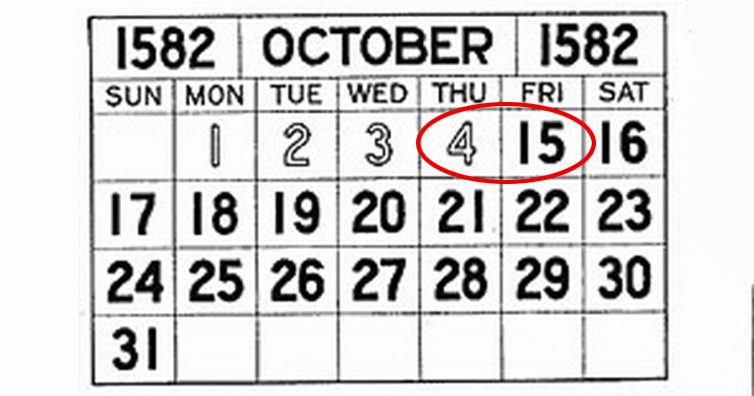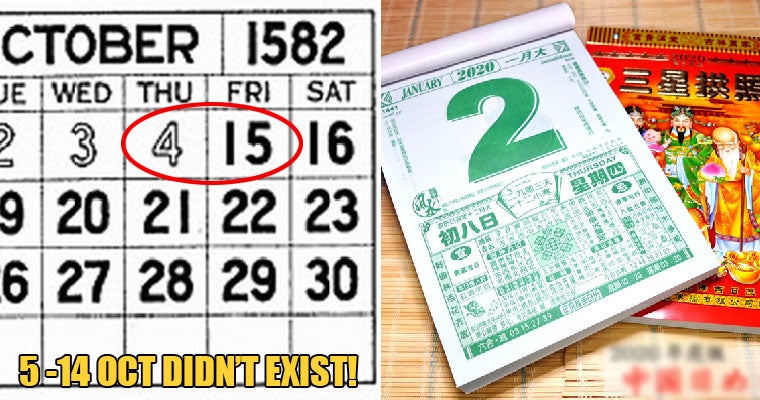The calendar has always helped us count our days and keep track of time. It has always been a useful tool to help us plan for future events and remind us of the changing seasons, and so forth.
However, imagine waking up one day, only to realise that you had been sleeping for the past 10 days! Yes, such an incident actually happened back in 1582.

Here’s a brief explanation of how the calendar has evolved and why people in the past have actually “slept through” 10 full days:
1. Once upon a time, each civilisation used its own calendar system

Source: xuehua
Back then when the world wasn’t as connected as it is now, each civilisation basically used its own calendar system to count the days. For example, the Chinese used the lunar calendar which has 354 days in a year, while Egyptians used their own Egyptian 365-day calendar which had 10 days a week.
The civilisations back then used calendars to mark the beginning of a season. Moreover, they were not connected to each other. So, there wasn’t a standardised calendar for the entire world.
2. Julius Caesar had made a calendar with 365¼ days in a year

Source: time and date
According to Live Science, after Julius Caesar learnt of Egypt’s 365-day calendar, he gathered the best philosophers and mathematicians to form the Julian calendar made up of 365/366 days spanning across 12 months. This took place around 46 B.C. and the months looked like this:
- Januarius (31)
- Februarius (28/29 every four years)
- Martius (31)
- Aprilis (30)
- Maius (31)
- Junius (30)
- Julius (31)
- Augustus (31)
- September (30)
- October (31)
- November (30)
- December (31)
Julius, the seventh month was actually named Quintilis until 44 B.C. before it was renamed to honour Julius on his birth month. Augustus, on the other hand, was initially named Sextilis until 8 B.C. before it was renamed to mark the rise of the Roman Empire during that very month.
The Julian calendar was seemingly accurate at the time. During this period, the world also started becoming more and more connected thanks to globalisation which led to more civilisations adopting the use of the Julian calendar as a standard system to count the days. And it looks just like the calendar system we have today… or is it?
3. The Julian calendar was actually off by 10 days after about 1,600 years

For 1,600 years, the world had been using the Julian calendar because it seemed like the most accurate calendar by far. But the leap days implemented in the Julian calendar were actually throwing off the dates and messing up the seasons.
Bear in mind that people used to keep track of the changing of seasons using this calendar. By the 16th century, however, people noticed that the first day of spring had been shifted 10 days ahead of its intended time. Accurately speaking, it was miscalculated by 11 minutes every solar year.
4. Because of this, the Gregorian calendar was introduced which caused the 10-day skip in 1582

Source: useless info junkie
In order to be on track with the changing of seasons and keep Easter as close to the spring equinox as possible, Pope Gregory XIII had implemented a new calendar system in 1582 with the help of a scholar named Aloysius Liliusa.
This calendar is very similar to the Julian calendar but with one small change. While the leap years still occurred once in every four years, only the century years (e.g. 1600, 1700, 1800) that are divisible by 400 are considered leap years. For example, 1600 and 2000 were considered leap years whereas 1700, 1800, and 1900 weren’t.
In addition to this, since the calendar was still 10 days behind, they needed to decide on a day to “reset” the months. With that, it was decided that 4 October 1582 was the day they compensated for the 10-day loss. This meant that the following day was 15th October 1582 instead of 5th October.
5. The Gregorian calendar wasn’t universally accepted at first
Many people were reluctant to follow the change, so only certain countries like Spain, Portugal, the Polish-Lithuanian Commonwealth and most of Italy accepted the change on that day.
Some countries only started adopting the Gregorian calendar hundreds of years later. For example, the British only imposed the Calendar (New Style) Act in 1750 to fix their 11-day loss; advancing from 2nd September 1752 to 14th September 1752.

Source: mental floss
Japan only started following the Gregorian calendar in 1872, while Korea in 1895, and China in 1912. And the latest country to have switched to the Gregorian calendar is Saudi Arabia back in 2016. That was just four years ago! Malaysia also utilises the Gregorian calendar while also taking note of important dates such as Chinese New Year and Ramadan from the lunar calendar and Islamic calendar respectively.
Up until now, not all countries have adopted the Gregorian calendar. However, the calendar system is still accepted as an international standard.
6. The Gregorian calendar is still OFF by 26 seconds from a solar year

As much as it is the most accurate calendar system currently, it is still off by 26 seconds from the solar year. It might seem inconsequential, but after adding a few hours of discrepancy since the Gregorian calendar was first introduced, by the year 4909, the calendar system will be ahead of the solar year by one full day.
And this is how we got the 10-day time skip in the calendar. So, how would you react if you woke up one day and suddenly realised you had been sleeping for 10 days? Tell us your reaction in the comments section!
Also read: This Korean Pocketed Calendar Can Help You Save At Least RM3,000 a Year!



































